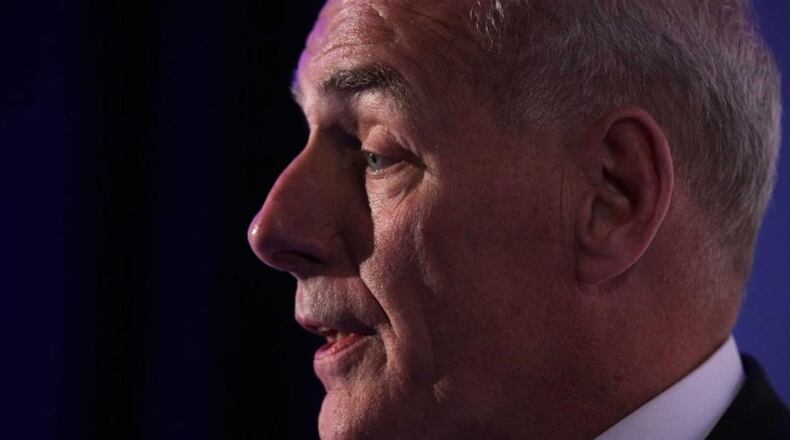White House Chief of Staff John Kelly drew criticism Monday after he suggested that the Civil War happened because of “the lack of the ability to compromise” while discussing the historical significance of Confederate memorials.
Kelly made the comments during an interview that aired Monday night on Fox News's "The Ingraham Angle." Kelly was asked about a Virginia church that decided to move plaques that honored George Washington and Confederate Gen. Robert E. Lee in the wake of racially charged violence in Charlottesville, Virginia, The Washington Post reported.
Kelly called Lee “an honorable man” who “gave up his country to fight for his state, which 150 years ago was more important than country.”
“Now it’s different today,” Kelly told host Laura Ingraham. “But the lack of an ability to compromise led to the Civil War, and men and women of good faith on both sides made their stand where their conscience had them make their stand.”
He added that it’s “very, very dangerous” for people to view historical events through the lens of modern morality.
“History’s history,” Kelly said. “I think we make a mistake … as a society, and certainly as individuals, when we take what is today accepted as right and wrong and go back 100, 200, 300 years or more and say, ‘What Christopher Columbus did was wrong.’”
His comments drew swift rebuke on social media from critics who argued that multiple attempts were made to “compromise” before the war broke out.
“Notion that Civil War resulted from a lack of compromises is belied by all the compromises made on enslavement from America’s founding,” African-American writer Ta-Nehisi Coates wrote in a series of tweets slamming Kelly.
“I mean, like, it’s called The three fifths compromise for a reason. But it doesn’t stand alone. Missouri Compromise. Kansas-Nebraska Act. Lincoln's own platform was a compromise. Lincoln was not an abolitionist. He proposed to limit slavery's expansion, not end it. During the Civil War, Lincoln repeatedly sought to compromise by paying reparations--to slaveholders--and shipping blacks out the country.”
The debate over Confederate monuments in America ramped up over the summer after violence broke out between white supremacists protesting the removal of a Lee statue from a park in Charlottesville and counterprotesters.
President Donald Trump was criticized for his response to the incident, which left one woman dead and dozens more injured, after he said that “both sides” were to blame for the violence. Critics questioned his unwillingness to condemn white supremacy outright.
Trump told a crowd gathered for a rally in Arizona in August that the removal of Confederate statues was tantamount to trying to wipe out American history.
“They’re trying to take away our culture, they’re trying to take away our history,” Trump said. “And our weak leaders, they do it overnight.”
Still, dozens of statues were taken down in cities across the country after the Charlottesville protests.
About the Author
The Latest
Featured

